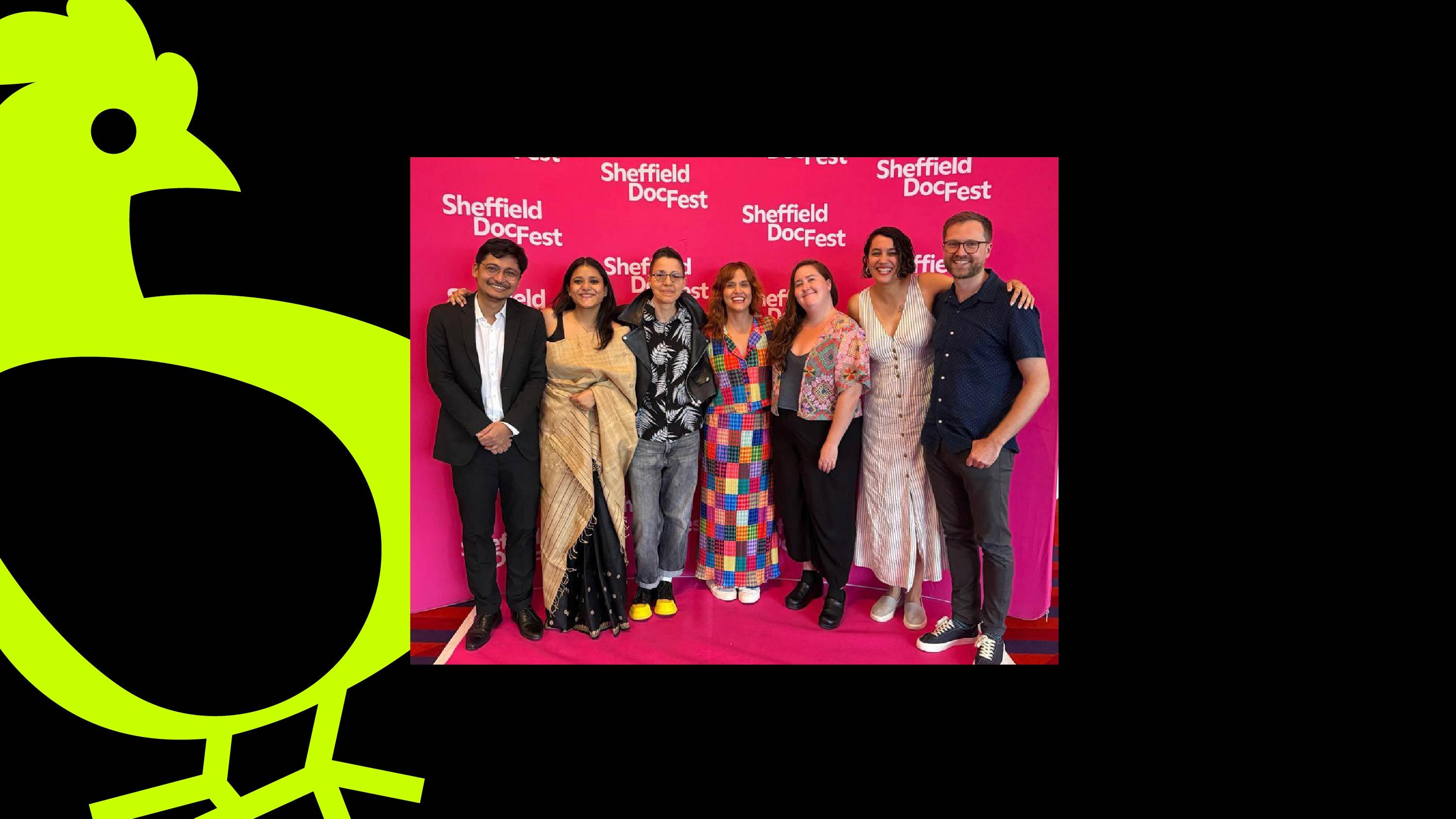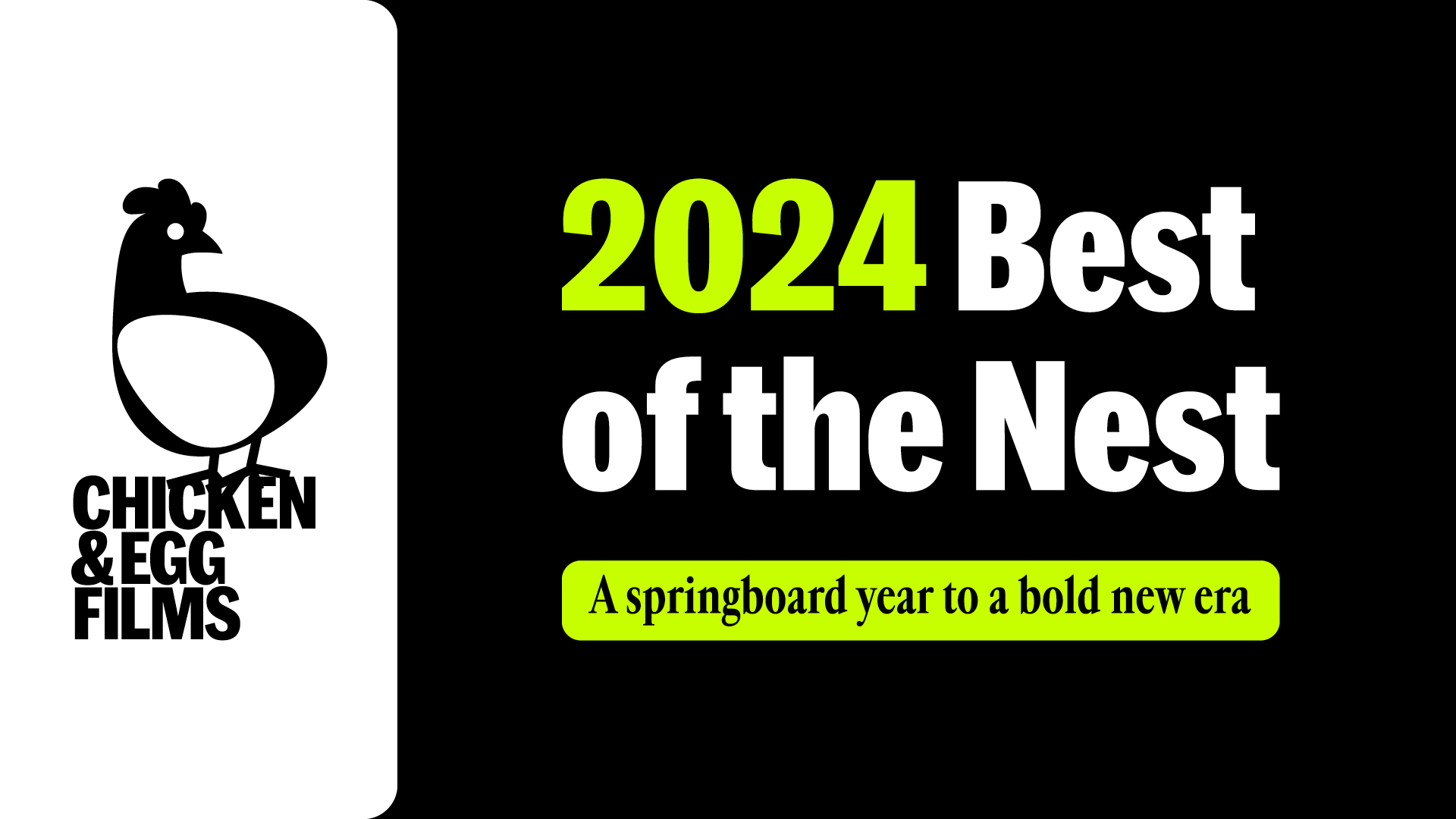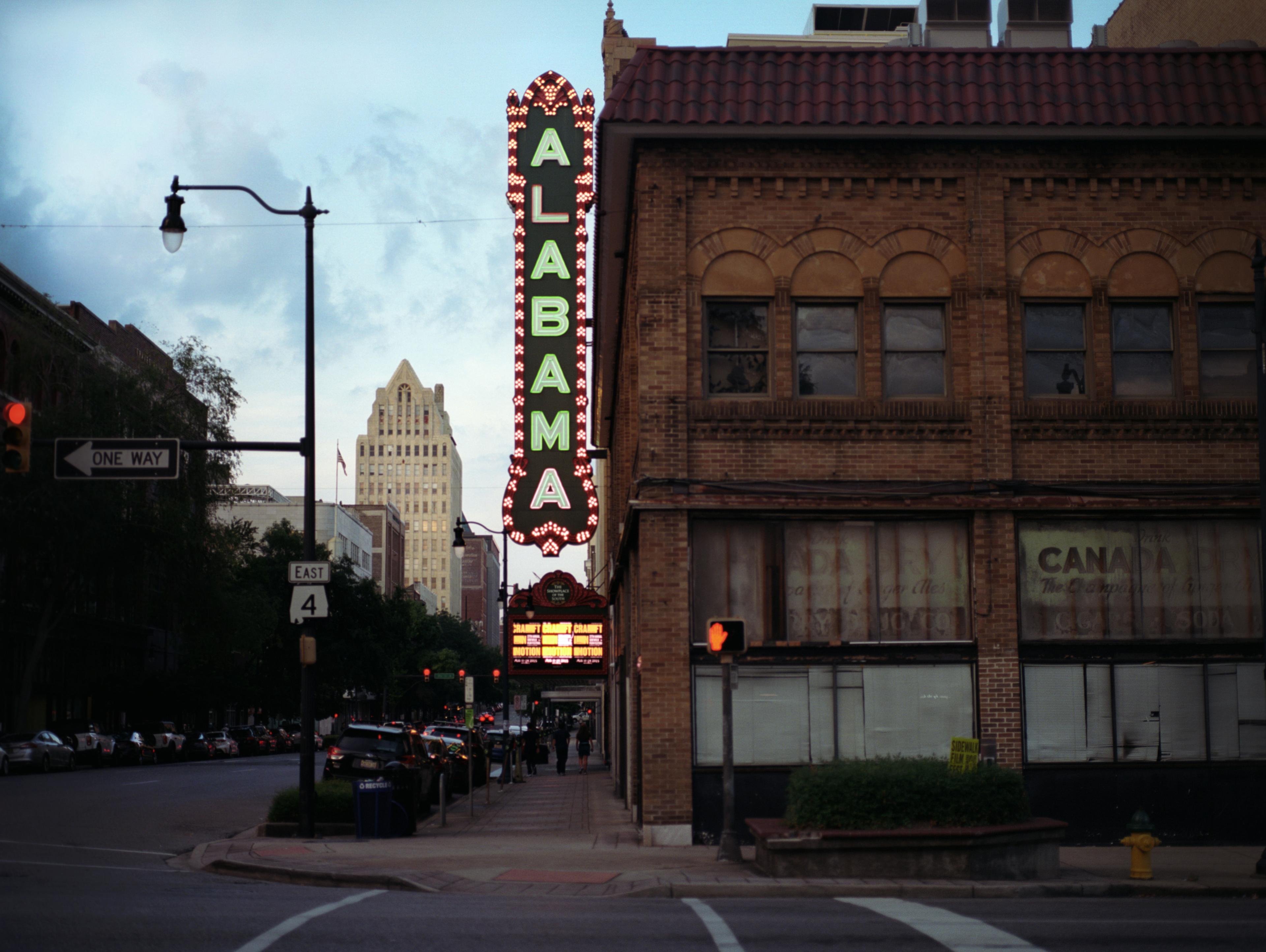
Earlier this summer, Chicken & Egg Films hosted a Works-In-Progress Showcase at the 2025 Sheffield DocFest. Industry & Artist Development Manager Tobi Phang-Lyn shares insights about the event, including its planning, impacts, and how it fit within the larger festival at Sheffield.
Communications Director Hannah Thomas (HT): Hi Tobi! What brought Chicken & Egg Films to Sheffield DocFest this year?
Industry & Artist Development Manager Tobi Phang-Lyn (TP): Hi Hannah! Well, Chicken & Egg Films has had a relationship with Sheffield dating back way before my time. It’s a key international festival on the European circuit, and over the years we’ve found many exciting ways to partner with the DocFest team and create strategic opportunities for our filmmakers.
I attended the festival for the first time in 2024, and was moved by how boldly they showed up in both solidarity with and celebration of marginalized communities. Their values were apparent in their programming and partnerships. So when myself and Program Director Kiyoko McCrae met with Patrizia Mancini, Head of Industry at Sheffield DocFest, toward the end of the festival that year, it was the first of many conversations imagining what a partnership in 2025 might look like.
That collaboration turned out to be a showcase highlighting five supported works-in-progress films (seven filmmakers in total) from around the globe, which I’m excited to share more about.
You know, given the current political moment we’re facing in the US and beyond, the increasing threats and violence to women, trans communities, immigrants, and beyond, the defunding of public media, and so much more, we believed this Showcase could function as a platform to uplift and support a few of the filmmakers making incredibly thoughtful, human-centered work in the face of all that’s happening.
Also, it’s C&E’s 20th anniversary this year, and we’re finding ways to show up boldly and celebrate our role in the doc ecosystem. For us, this type of event is so exemplary of the holistic support we hope to offer our filmmakers. C&E is your champion–and that doesn’t end once your program year is over.
HT: Thank you for that context! Was the Showcase more or less a pitch? If not, how was it different?
TP: Pitches are such a crucial part of festivals and markets. They help a film reach people that can take it across the finish line via financial investment, word of mouth buzz, and networking and dot-connecting. We had similar outcomes in mind when dreaming up this event. But we were interested in flexing away from some of the dynamics inherent to the traditional pitch that can put undue pressure on filmmakers or set them up to receive feedback on their pitches, rather than their projects, which may or may not be constructive. We always tell our filmmakers that no one knows the story they are trying to tell better than they do. As a result, we designed what we hope was an empowering space where our filmmakers got to present their projects on their terms, sharing not only a sneak peek of what their films are looking like but giving contexts around how the stories came to be, why they’re important, and what they envision their impact being. The showcase had no on-the-spot critiques or feedback, and instead attendees were invited to connect with filmmakers for 1:1 conversations during the festival.
"We designed what we hope was an empowering space where our filmmakers presented their projects on their terms... how the stories came to be, why they’re important, and what they envision their impact being."
HT: Got it! Sounds freeing! Can you share more about what went into shaping the WIP Showcase? What were the ingredients for success?
TP: One of the first aspects of putting together the Showcase was choosing a strong cohort to, well, showcase. A top consideration for this process was, is this project at a stage where a public presentation could really make a difference in terms of connections or visibility? Every project was so distinct and different within the cohort, and that meant the group was ultimately representative of the stories and artistry that we love to support. We were proud of that. We were able to highlight projects and invite alumni filmmakers from across several of our core programs, many of whom had never met before, had various levels of experience with filmmaking and attending international festivals, and were in different stages with their work.
Then the C&E team worked closely with each film team over several weeks to help them prepare their presentations, which included an introduction to their work and project needs plus 10-15 minutes of visual material from their feature-length films. Tereza Simikova, who works with us as an International Program Consultant, also met with each team to strategize and make introductions for onsite meetings during the fest.
And, ultimately I think it went really well! We’ve received a lot of positive feedback from attendees who connected with our filmmakers at DocFest. I know I’m not alone on the team in feeling proud of the program and of our filmmakers. We’ve had folks share they felt it was one of the best showcases at the festival, and that’s such a testament to our filmmakers, their stories, all the preparation they did, and their willingness to be vulnerable and invite us into seeing their work at a work-in-progress stage.
HT: It seems like a unique experience to go to Sheffield together as a group of filmmakers, kind of operating as a unit! How did that work?
TP: Our seven filmmakers attended the festival as part of a “Chicken & Egg Films Delegation.” Sheffield hosts a few different delegations from around the world every year. It was a positive experience and beautiful opportunity for the filmmakers to get to know each other and each other's work. It was also a great way for the C&E team to show up as facilitators and supporters of course, but also as humans. We made sure to coordinate a few group activities for us all to bond throughout the festival outside the Showcase. We’ve already heard some feedback from filmmakers that it was a less intimidating, overwhelming experience to attend a festival with a cohort and C&E support along the way.
And that tees up another dynamic we tried to be mindful about with this group. Festival and industry spaces can often feel impersonal or high stakes, and as a filmmaker, you’re constantly opening yourself up to rejection. Kiyoko and Tereza are seasoned mentors and offered guidance to the cohort about how and why some of these dynamics of isolation and rejection exist, and, just as importantly, how to disregard or move through them.
And actually, while we were at the festival, one of our filmmakers told me this pact they had made with a peer to see who could get the most rejections from grants, fellowships, and applications. They did that basically to take the sting out of the experience, and to encourage each other to ultimately just go for it and accept that rejection is a part of the journey. I think that mindset of solidarity and encouragement was very present in the cohort.
"Sheffield and its community are radiating perseverance and their vision for the future is sorely needed right now."
HT: While at Sheffield, the team attended screenings, panels, filmmaker meetings, etc. What were some of the themes, challenges, and/or solutions that you heard? What resonated with you?
TP: What stuck with me was this idea that everyone in the documentary ecosystem—filmmakers, audiences, industry reps—we authentically, collectively believe that documentaries are a means to spark change and challenge systems, behaviors, and perspectives. Sheffield and its community are radiating perseverance and their vision for the future is sorely needed right now.
There are no shortage of challenges: the commodification of art and filmmakers, barriers to finishing and distributing films, finding belonging and support in the industry as folks with marginalized identities, cuts to arts and public funding, to name a few. But there are so many people willing to name those challenges outright and they’re already doing great work to innovate and share real solutions. Some of the ideas that intrigued us centered on how we can all create more space for success. For example, how might we encourage different film formats, like supporting medium length works in addition to short and feature docs? How might we partner with theaters in new ways to fill in unused slots and gaps in the schedule?
HT: You know I love a good slogan. My last question is: Sheffield DocFest's tagline is "Where perspectives meet." What does that mean to you and how did the festival bring that idea to life?
TP: I do know that about you! You love a crisp message. The idea of "where perspectives meet" resonates. I’ll say, DocFest does a wonderful job bringing their tagline to life with a variety of accessible forums—panels, roundtable discussions, showcases, delegations, receptions, 1:1s, Q&As, and screenings.
In the context of Chicken & Egg’s work, we think about this regularly when we bring together cohorts for retreats, for example. And it certainly came up as we curated this delegation of filmmakers. There's something magical that happens in a 1:1 or in a small group when people from different backgrounds come together and learn from one another. Our goal is always to facilitate deep connection and exchange, and our event at Sheffield offers a great example of that. Attendees of the showcase got to know not only our filmmakers and their work, but also got a peek into their passions, their different communities, and their values through their films.
"Our goal is always to facilitate deep connection and exchange, and our event at Sheffield offers a great example of that."

